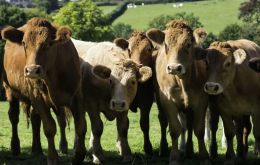MercoPress. South Atlantic News Agency
Agriculture
-
Friday, January 2nd 2026 - 08:16 UTC
China announces beef import quotas

Beginning in 2026, the Chinese Ministry of Commerce will implement a three-year “protective measure” consisting of a 55% tariff on beef imports exceeding specific quotas. The initiative was found to hit the United States, Brazil, and Australia. However, it would leave Uruguay unharmed and prevent any Argentine expansion.
-
Wednesday, December 31st 2025 - 09:09 UTC
FAO officially launches 2026 as the International Year of the Women Farmer

The Food and Agriculture Organization of the United Nations (FAO) officially launched The International Year of the Woman Farmer 2026, a global campaign aimed at recognizing women’s indispensable yet often overlooked contributions to global agri-food systems and to galvanize efforts to close persistent gender gaps.
-
Thursday, December 18th 2025 - 08:05 UTC
India and Argentina strike 2025-27 agricultural development agreement

The Indian Council of Agricultural Research (ICAR) and Argentina's National Institute of Agricultural Technology (INTA) have signed a bilateral agreement on agricultural collaboration in natural resource management and sustainable agronomy, encompassing zero tillage, mechanization, micro-irrigation, and fertigation.
-
Wednesday, December 10th 2025 - 19:21 UTC
FAO Food Price Index declines in November for third consecutive month

World food commodity prices declined in November, led by lower international quotations for all major staple foods except cereals, according to the benchmark measure released by the Food and Agriculture Organization of the United Nations (FAO).
-
Tuesday, December 9th 2025 - 21:58 UTC
Southern Brazil hit by extratropical cyclone

Heavy rainfall triggered by an extratropical cyclone battering Southern Brazil caused widespread flooding on Tuesday, turning streets into rivers and hillsides into waterfalls across Florianópolis, São José, Palhoça, and Biguaçu.
-
Saturday, December 6th 2025 - 09:51 UTC
Kiwi forestry giant approved for Uruguayan benefits program

New Zealand forestry giant Claymark has received official approval for a major investment in Uruguay, committing over US$100 million to establish large-scale operations in the South American nation.
-
Thursday, December 4th 2025 - 10:07 UTC
Paraguayan meat exports to pierce US$2bn ceiling this year

According to a study by the Paraguayan Meat Chamber (CPC), released on Wednesday in Asunción, the South American country is projected to surpass the US$ 2 billion export ceiling for the first time by the end of 2025. The survey foresaw a total of US$2.169 billion worth of outbound trade.
-
Wednesday, December 3rd 2025 - 11:16 UTC
Brazil clinches export clearances with Philippines, Guatemala, and Nicaragua

Brazilian authorities have completed negotiations with the Philippines, Guatemala, and Nicaragua to expand agricultural exports to these countries after reaching an understanding on sanitary and phytosanitary requirements.
-
Monday, December 1st 2025 - 09:06 UTC
Venezuelan coffee exports grow 500% from 2024

Venezuelan officials have reported a 500% rise in coffee exports this year compared to 2024. The announcement was made during the recent IV International Meeting of Venezuelan Specialty Coffees (Eicev 2025).
-
Saturday, November 29th 2025 - 09:46 UTC
Uruguay approves mass culling of parakeets to save crops

The Uruguayan government, under pressure from the agricultural sector over millions in crop losses, has approved a new emergency plan for the mass culling of parakeets, utilizing controversial methods like toxic baits and adhesives.